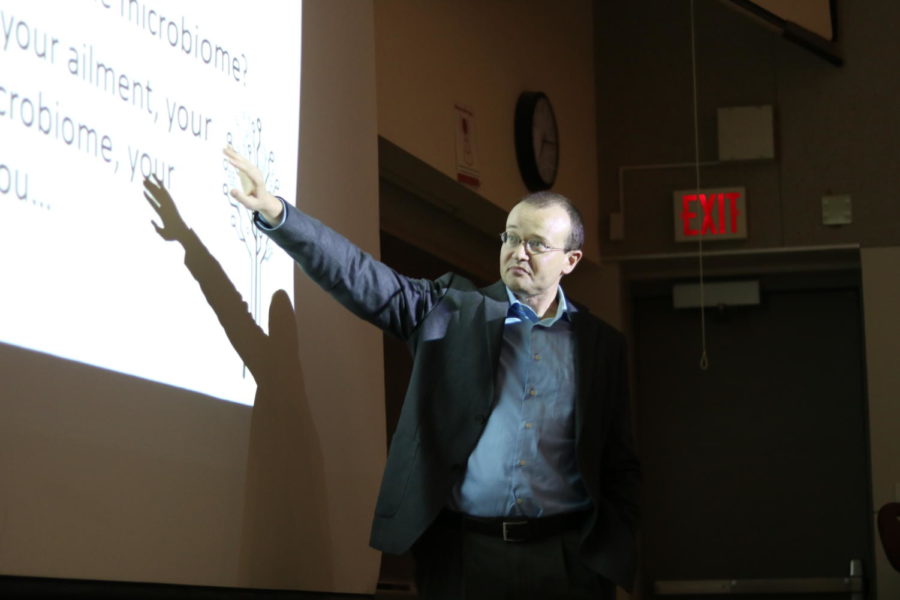Ethical considerations of the future of food
Brian Green of Santa Clara University speaks in the Agronomy Hall on April 24 about the ethical implications of emerging and disruptive food technologies.
April 24, 2018
As technology advances in the food industry, there are a multitude of ethical concerns that accompany the advancements. Brian Green, Director of Technology and Ethics at Santa Clara University, discussed these ethical issues in his lecture “Ethics, Emerging Technologies, and Food,” which is the final lecture in the 2017-18 Helen LeBaron Hilton Endowed Chair Lecture Series.
Technology has become increasingly prominent over recent years in the food industry with developments in areas like Artificial Intelligence, 3-D printing, virtual reality and drone usage. The industry aims to utilize these technologies to make agriculture and the food system more efficient, sustainable and advanced.
For example, the idea of using self driving tractors in the future of agriculture, just as self driving cars are being discussed as a part of the world’s future technology.
“At some point maybe you don’t need a person anymore,” Green said.
However, these advancements in agriculture are going to switch jobs from manual labor to more technology oriented positions. Green said this is already happening in places like California.
Even if the jobs do change, there is ultimately the issue of unemployment and job loss. But Green said it comes down to if the loss of these jobs will be overall more beneficial or hurtful to the population.
“Maybe automating these things is actually going to be good because people don’t want the jobs in the first place,” Green said. “On the other hand if you really like your job, then this is going to come as a blow to you.”
These changes are not in the distant future and impact agricultural education as well.
“The role of virtual reality in education is going to become more and more utilized in the next few years as virtual reality penetrates more into the culture,” Green said.
But with these advancements come moral dilemmas, such as the issue of cultured meat.
Cultured meat is grown from older animal cells rather than by killing new animals.
Although this may seem great because of the efficiency, Green said this raises a few major ethical questions. Would vegetarians and vegans be able to eat cultured meat? What about those who do not eat meat for religious reasons?
Technology in our food system broadens our scope to what society can achieve, but it raises those complex, and often difficult, questions.
Green warns that we need to take responsibility for the effects of our technology and make sure it is being used for good. And if the technology isn’t being used for good, we need to find a way to control the evil. Especially with new technology that the consequences are still risky and unknown.
“We don’t actually know all the time what we are going to do until the bad thing actually happens,” Green said.
In the western world, Green said that we are used to reacting to our technology’s negative affects rather than preventing them. He said we can only stay in a system this way for so long, because some day we might invent technology so advanced it goes off on it’s own, and we will not be able to reverse the effects.
“Our culture is set up in a way that we wait for a disaster to happen and then respond to it,” Green said.
No matter what advances we do make, Green said that the responsibility to make the right decisions is on everyone individually. The consequences of our technological mistakes will be severe because of the extreme importance of food to humans and society.
“If we are what we eat, then if we mess up our food system, we mess up ourselves,” Green said.







